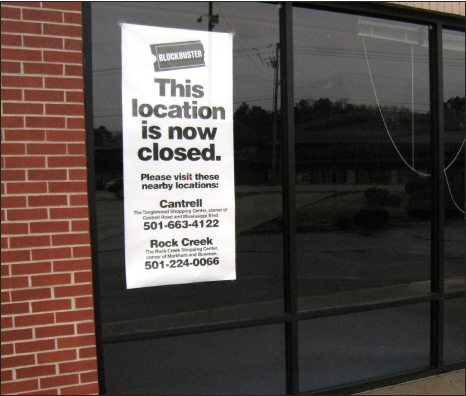Patrons find alternatives in RedBox


CLOSED — Blockbuster filed for bankruptcy last month because other options such as RedBox are on the rise.
The video rental store is slowly becoming the dodo of technology.
The video-rental chain Blockbuster Inc. filed for Chapter 11 bankruptcy under a $1 billion debt on Sept. 23, according to CBS News. The move caused the company’s stock to be delisted from the New York Stock Exchange and a large majority of its 3,300 stores are expected to close in the coming year.
This announcement came on the heels of Hollywood Video, another of the nation’s major video chains, filing for bankruptcy in early February, eventually liquidating its product in August.
Small businesses in video merchandise are also struggling. There were 16,237 video-rental stores in the country in 2007, down from 23,036 in 1997, according to the U.S. Census Bureau. SNL Kagan anticipates physical rentals from U.S. video shops in 2010 to be down 56 percent from the 2001 peak. By 2014 ,only 4,400 stores will remain open, holding just 11 percent of the $9.8 billion video rental market, according to Screen Digest.
Competition from outside sources is the primary reason for this steady decline.
The two major challenges to the traditional store model have come from Netflix and Redbox. Both, the former with a monthly subscription service to mail-order movies and the latter with convenient credit card kiosks, offer consumers cheaper and quicker access to flims. Other venues do not even require physical copies of their product. Websites such as YouTube, Amazon, Best Buy’s CinemaNow, Microsoft’s Xbox Live Marketplace, Sony’s PlayStation Network, Netflix and Wal-Mart’s Vudu allow online viewing of movies and television shows.
The collapse of the video store is degrading the very essence of what movies themselves are supposed to be — a social experience.
Video stores were places of camaraderie and nostalgia. Members of the neighborhood once came together on Friday nights to pick out a weekend movie. For servicing film buffs looking for indie titles, young couples seeking romantic comedies and families looking for kid-friendly films, the movie store was a place of conversation and friendliness. In a video store, word-of-mouth recommendations of “must-see” titles inspired choices. A variety of people — both customers and employees — were drawn together for the purpose of entertainment. This attribute is being lost as movie selection becomes more impersonal.
“There is something wonderful about walking into a video store and seeing all the titles lined up on a shelf. You don’t get that with an iTunes interface or a cable on-demand menu,” Joshua Greenberg said.
Movies were designed as a medium for humanity to convey stories between one another. As technology continues progressing and people follow the culture’s trend of instant gratification, an integral component of the genre will be lost. The final nail in the coffin for this time-honored institution will be when consumers allow their desire for convenience to overcome community, causing all movie rental stores to close their doors.
FLYNN is an opinion writer.
